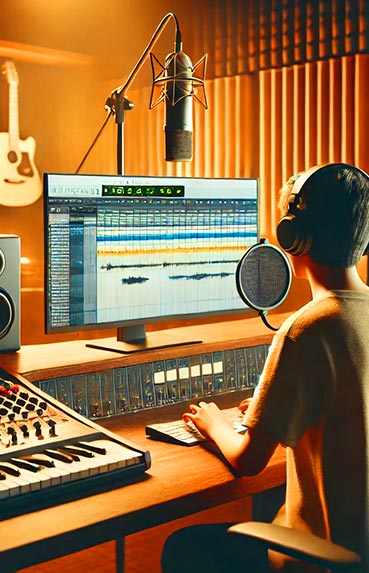Artificial intelligence (AI) has evolved from being a mere futuristic tool to becoming an integral part of our daily lives. From recommendation algorithms on streaming platforms to visual effects in movies, AI is transforming the entertainment world in ways we never imagined. This article explores how AI is reshaping this industry, offering new opportunities and posing challenges we must address.
The Role of Artificial Intelligence in Film Production
The film industry has been one of the first to adopt AI technologies to enhance its production processes. From pre-production to post-production, AI is present at every stage of film development.
Pre-production: Planning and Scripts
In the pre-production stage, AI is used to analyze scripts and predict their potential success. Tools like ScriptBook use algorithms to evaluate a script and provide a score based on its likelihood of box office success. These tools help producers make informed decisions about which projects to fund, thereby reducing investment risk.
Production: Special Effects and Animation
During production, AI has revolutionized special effects and animation. AI-assisted animation software allows creators to generate more realistic characters and settings with less human effort. A notable example is the use of AI in creating digital characters in movies like 2019's "The Lion King," where technology helped generate animals with realistic facial expressions.
Post-production: Editing and Enhancement
In post-production, AI plays a crucial role in video editing and image quality enhancement. Tools like Adobe Sensei use AI to automate editing tasks, allowing editors to focus on more creative aspects. Additionally, AI is used to improve the resolution of old images and videos, as seen in the restoration of classic films.
The Influence of AI in Music
Music is another entertainment field that has seen a significant impact from AI. From composition to distribution, AI is redefining how music is created and consumed.
AI-Assisted Music Composition
AI algorithms can now compose music, imitating specific styles and genres. Tools like AIVA (Artificial Intelligence Virtual Artist) can create original musical pieces that can be used in films, video games, and other media. This not only saves time for human composers but also opens up new creative possibilities.
Personalization and Recommendation
Music streaming platforms like Spotify and Apple Music use AI algorithms to offer personalized recommendations to users. These algorithms analyze user behavior, musical preferences, and listening patterns to suggest new songs and artists, enhancing the user experience and increasing platform engagement time.
Production and Mastering
In music production, AI is used for automatic track mastering, adjusting sound levels and equalization to achieve a high-quality final product. Services like LANDR offer AI-based mastering, allowing independent artists access to professional production tools without prohibitive costs.
Video Games and Virtual Reality
The video game and virtual reality sector is one of the most innovative in adopting AI, using technology to create more immersive and personalized experiences.
Character and Environment Design
AI is used to generate non-playable characters (NPCs) with realistic behaviors and game environments that dynamically adapt to player actions. This results in a more immersive and challenging gaming experience, as seen in games like "The Elder Scrolls V: Skyrim" and "Red Dead Redemption 2."
Personalized Gaming Experiences
Developers are using AI to create personalized gaming experiences that adapt to the player's preferences and skills. Machine learning algorithms analyze player behavior to adjust game difficulty, challenges, and rewards, offering a more engaging and customized experience.
Virtual and Augmented Reality
AI is driving the development of virtual reality (VR) and augmented reality (AR) technologies, enabling more interactive and realistic experiences. In AR applications like Pokémon GO, AI is used to integrate virtual elements into the real world, creating unique gaming experiences that blend physical and digital.
It's fascinating to see how AI is transforming not only the way we consume entertainment but also how it's created.
Ethical Challenges and Considerations
Despite the significant advances AI has brought to the entertainment world, it also poses ethical challenges and considerations that need to be addressed.
Copyright and Intellectual Property
AI-assisted content creation raises questions about intellectual property. Who owns the rights to a piece of music composed by a machine? This is a topic still under debate, and copyright laws must evolve to adapt to this new reality.
Representation and Bias
AI algorithms can perpetuate existing biases if not carefully designed. In film production, for example, algorithms that analyze scripts may favor stories that align with popular or conventional narratives, thus limiting content diversity. It's essential for developers to work on eliminating biases in their algorithms, ensuring fair and diverse representation in entertainment.
Impact on Employment
The automation of creative tasks raises concerns about the impact on employment in the entertainment industry. While AI can improve efficiency and reduce costs, it may also lead to job loss in areas like video editing and music production. It's crucial to find a balance between technology adoption and job preservation.
Practical Tips for Adapting to the AI Era in Entertainment
For entertainment professionals, adapting to the AI era involves leveraging the opportunities technology offers while managing the challenges.
Training and Skill Development
- Invest in continuous training: Staying updated with the latest AI tools and technologies is essential to remain competitive in the entertainment industry.
- Develop complementary skills: As AI automates certain tasks, professionals should focus on developing skills that complement technology, such as creativity and innovation.
Collaboration with Technology
- Integrate AI into creative processes: Use AI as a tool to enhance creativity and efficiency rather than viewing it as a threat.
- Collaborate with AI experts: Work with engineers and data scientists to develop customized solutions that meet the specific needs of each project.
Foster Diversity and Inclusion
- Develop inclusive algorithms: Ensure that AI algorithms are inclusive and do not perpetuate existing biases.
- Promote diversity in development teams: Encourage diversity in development teams to ensure fair and equitable representation in AI-generated content.
Artificial intelligence is redefining the world of entertainment, offering exciting opportunities and significant challenges. By adopting a proactive and ethical approach, industry professionals can maximize the possibilities AI offers, creating innovative and engaging entertainment experiences for audiences worldwide.

















